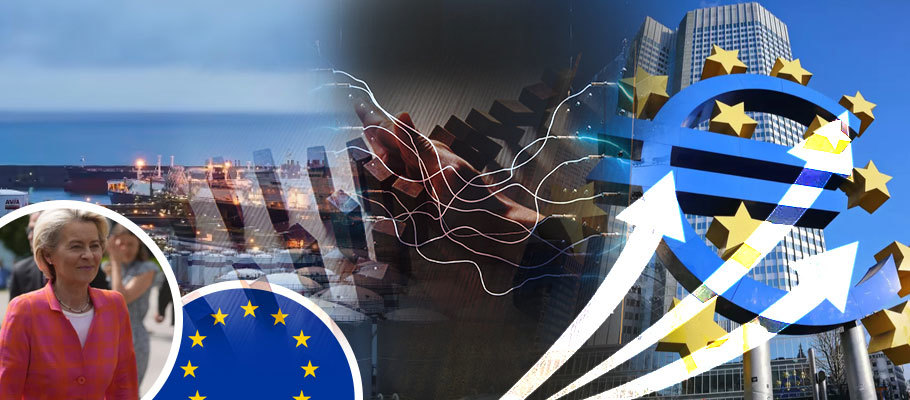
Published: August 31st, 2022
A welcome reduction in surging natural gas spot prices is offering the Euro support as August 2022 comes to a close.
Gas prices for future delivery in the Eurozone were down close to 20 per cent at the time of writing, pushing EUR back above parity with the Greenback and extending a multi-week run of gains for the single currency against Sterling.
An analyst note from Barclay’s Forex Strategy Unit said, ‘a lowering of natural gas futures for European delivery arrived as a breath of fresh air for the Euro after the EU promised emergency intervention and power market reform.’
Gas prices in Europe look to be receding thanks to new data showing that European winter gas stockpiles are rising again, reducing the risk of rationing and economic slowdown. Politicians in Brussels are also looking to change the electricity market’s pricing structure, a move with the potential to bring power prices down.
A report by Gas Infrastructure Europe published this week said that Europe was well on the way to achieving the EU's target of returning gas storage to 80 per cent of capacity by November.
'Europe’s natural gas stockpiles are being rapidly replenished, though at peak prices. Under normal circumstances governments would top-op Winter storage facilities when prices were low. However, given the urgency of the current situation, Germany has offed government-backed loans to utilities enabling them to buy at any price’.
This suggests reduced physical demand in Winter if gas companies have the freedom to be more price responsive when meeting their storage requirements.
President of th4 European Commission Ursula von der Leyen said this week that Brussels intends to reform European energy markets in response to the current supply crunch. Britain has already said similar measures re in the works.
Under existing market structures, cheaper sources of power generation like wind and solar power become more expensive when gas prices are high, raising costs for utilities and households. The EU wants to break this link by disentangling the final price of wholesale electricity from the price of its most expensive element, in this case gas-fired generation.
Both Brussels and Westminster want to create separate markets for carbon-centric and carbon-zero power generation.
Von der Leyen told Bloomberg on Tuesday that the intensifying energy squeeze hitting Europe has exposed the limitations of current electricity market structures, demanding a notable intervention to stave off a full-blown winter energy crisis.
August has been a torrid month in the Eurozone as gas and electricity pricing has skyrocketed against reduced supply from Russia and rising demand as Europe sprints to re-fill already depleted gas storage facilities before the winter cold sets in.
‘Surging power prices have laid bare the inherent risks in our current electricity market design,’ von der Leyen said’.
As recently as last week, EUR exchange rates were being severely impacted by reduced gas supplies and rising prices, a politics-driven pincer movement that analysts saw little hope of abating.
The Pound rallied against the Euro in late August as gas and electricity prices reached record highs and more reductions in Russian gas supply appeared to be imminent.
On 23rd August the benchmark Dutch TTF European gas price soared to EUR 285 per MWh, raising power supply contracts in France and Germany to new record highs.
Those shifts drove the Euro-Dollar exchange rate under the 1.0 level, as currency traders hurried to selloff their EUR positions on fears of a Winter recession.
Rising electricity prices were worsened by outages at French nuclear power facilities, and the prospect of further sanctions on Russian gas.
The Kremlin announced a temporary shutdown in mid-August of the vital Nord Stream 1 pipeline that delivers gas to Germany, a move analysts agreed was clearly driven by politics, not maintenance issues as claimed by Russia.
The decision to reduce supplies to Germany occurred just as a gas bidding war was kicking off. In August, European governments led by Germany began a push to top-up their gas storage facilities ahead of what could be a difficult winter of protest and general discontent.
The concern is that shutting down Europe’s primary gas pipeline, even for a few days, will be extended further in an effort to disrupt gas markets. The result will be an even more vulnerable Euro, which could experience sudden losses over the next few weeks.'
‘The shifting economic outlook dovetailed with a surge in natural gas prices is hurting the prospects for Euro exchange rates in currency markets,’ said Hans Jucker, Head of Forex Strategy at Allianz. ‘Both of these concerns might continue to push the Euro lower in the short term’.
Great Britian is also feeling the pinch from higher gas prices, but traders see the Eurozone as being more exposed to the economic fallout from the Ukraine crisis.
That’s because of the central role Germany's manufacturing sector plays in determining Eurozone growth. German factories rely heavily on gas for power generation. If rising energy costs cool growth in the content’s industrial heartland, the knock-on effects could lead to a region-wide recession.
While British gas prices are also driven partly by European market forces, there are some differences. The UK still produces its own gas domestically from the North Sea. It’s sea ports also have terminals designed for offloading and storing Liquified Natural Gas (LNG).
Germany, on the other hand, doesn't have a comparable LNG terminal at its northern ports. Pipelines like Nord Steam are its number one source of supply. After Scotland, Britain’s number one gas provider is Norway, which doesn't use its gas supply for political leverage, at least not on the scale that Russia appears to be doing with the EU in response to economic sanctions.